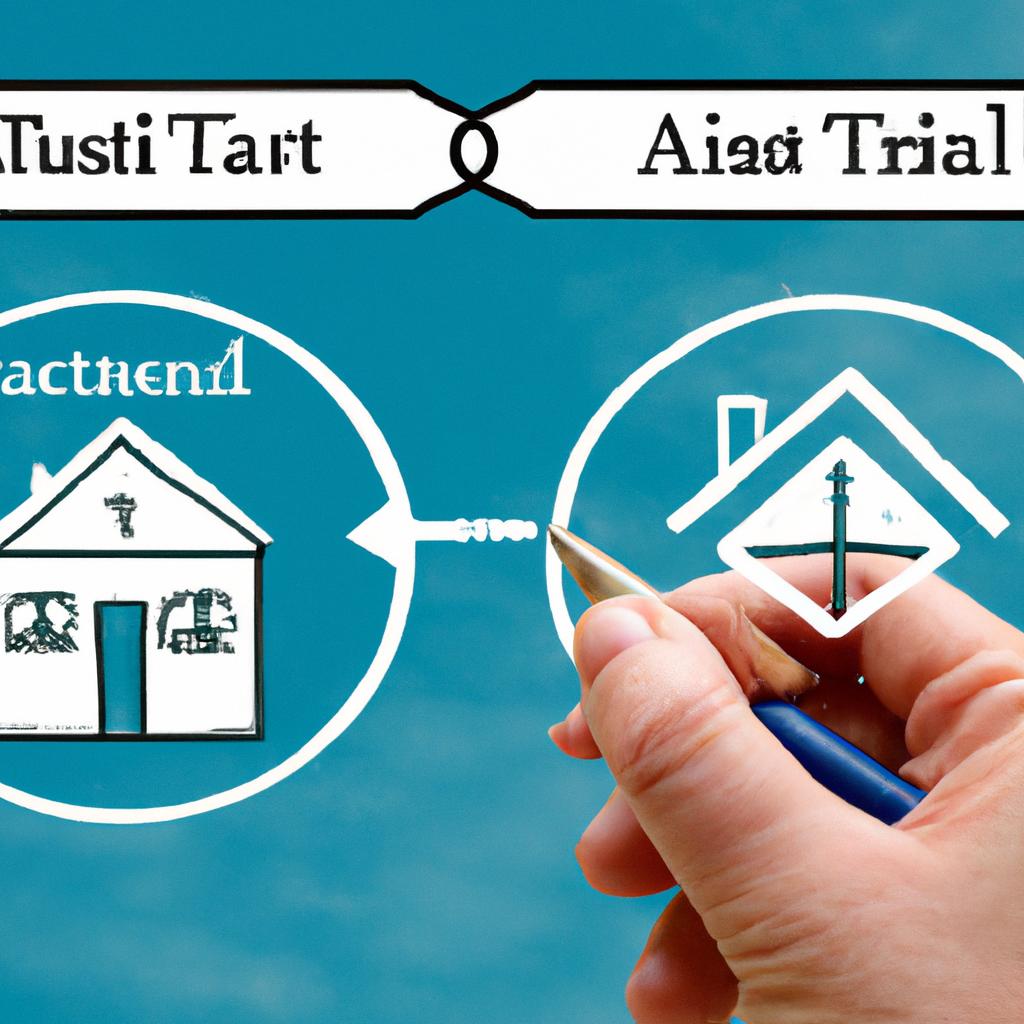As seasoned legal professionals at Morgan Legal Group in New York City, we understand the importance of navigating the complexities of estate management. Among the many intricacies that can arise in this field, the distinction between trust accounts and estate accounts is a crucial consideration. In this article, we will delve into the differences between these two types of accounts, shedding light on their respective functions and implications for effective estate planning. Join us as we unravel the intricacies of trust accounts versus estate accounts, providing valuable insights for those seeking to secure their assets and legacy.
Trust Account vs Estate Account: Understanding the Key Differences
When it comes to managing assets and ensuring their distribution according to one’s wishes, understanding the key differences between a trust account and an estate account is crucial. While both serve important purposes in estate planning, they have distinct characteristics that set them apart.
Trust Account:
- Created during the grantor’s lifetime
- Managed by a trustee who oversees the distribution of assets to beneficiaries
- Can bypass the probate process, ensuring privacy and efficiency
Estate Account:
- Created upon the death of the decedent
- Managed by an executor appointed by the court
- Assets are subject to probate, which can be a lengthy and public process

Choosing the Right Account for Your Needs: Factors to Consider
When considering whether to open a trust account or an estate account, it is important to weigh various factors that will impact your decision. Both types of accounts serve different purposes and are governed by different laws and regulations.
One factor to consider is the purpose of the account. Trust accounts are typically used for estate planning purposes, to protect and manage assets for beneficiaries. Estate accounts, on the other hand, are used to settle the estate of a deceased individual. Another important factor to consider is the level of control you wish to maintain over the assets in the account. Trust accounts offer more control and flexibility, while estate accounts are subject to probate court oversight.

Maximizing Protection and Control: Recommendations for Managing Trust and Estate Accounts
When it comes to managing trust and estate accounts, it is crucial to understand the differences between a trust account and an estate account. While both serve the purpose of overseeing assets and distributing them according to specific instructions, there are distinct characteristics that set them apart.
**Trust Account:**
-
Created during the grantor’s lifetime
-
Assets are transferred into the trust
-
Managed by a trustee
- Avoids probate process
-
Provides privacy and control over asset distribution
**Estate Account:**
-
Created after the grantor’s passing
- Assets are transferred through the probate process
- Managed by an executor or personal representative
- Subject to probate fees and public record
- Distribution of assets governed by the will or state law

Navigating Legal and Financial Responsibilities: Ensuring Compliance and Success
When it comes to managing assets and finances for a client, understanding the difference between a trust account and an estate account is crucial to ensuring compliance and success. A trust account is a legal arrangement in which a trustee holds assets on behalf of a beneficiary. The trustee is responsible for managing the assets according to the terms of the trust. Trust accounts are typically used in estate planning to transfer assets to beneficiaries efficiently and securely.
An estate account, on the other hand, is a bank account that holds assets belonging to a deceased individual’s estate. These assets are used to pay off debts, taxes, and other expenses before distributing the remaining assets to heirs. Estate accounts are typically managed by an executor or personal representative appointed by the court. Understanding the nuances between trust accounts and estate accounts is essential for legal and financial professionals to navigate their responsibilities effectively and ensure compliance with applicable laws and regulations.
Q&A
Q: What is a trust account?
A: A trust account is a financial account that holds funds on behalf of a beneficiary, managed by a trustee.Q: What is an estate account?
A: An estate account is a financial account that holds funds and assets of a deceased person’s estate, managed by an executor or administrator.Q: What is the difference between a trust account and an estate account?
A: The main difference is that a trust account is set up during a person’s lifetime to hold funds for a beneficiary, while an estate account is set up after a person’s death to manage their assets.Q: Can a trust account and an estate account be the same thing?
A: In some cases, a trust account can become an estate account if the trust was created as part of the deceased person’s estate plan. However, they are typically separate entities with different purposes.Q: Who has control over a trust account?
A: The trustee has control over a trust account and is responsible for managing the funds in accordance with the terms of the trust.Q: Who has control over an estate account?
A: The executor or administrator of the deceased person’s estate has control over an estate account and is responsible for managing the assets and settling debts and taxes.Q: Are trust accounts and estate accounts subject to different rules and regulations?
A: Yes, trust accounts and estate accounts are subject to different legal requirements and may have different tax implications.Q: What happens to the funds in a trust account when the beneficiary dies?
A: The funds in a trust account may be distributed to the beneficiary’s heirs or remain in the trust, depending on the terms of the trust agreement.Q: What happens to the funds in an estate account after all debts and taxes are settled?
A: After all debts and taxes are settled, the funds in an estate account are distributed to the deceased person’s heirs or beneficiaries as outlined in their will or by state law.In Retrospect
In conclusion, understanding the difference between a trust account and an estate account is crucial for anyone involved in estate planning or managing assets. While both serve important functions related to managing finances and ensuring the proper distribution of assets, it is important to choose the right type of account based on your specific needs and circumstances. By being informed and making the right choices, you can ensure that your financial affairs are handled in a way that aligns with your wishes and protects the interests of your beneficiaries. We hope this article has shed light on the nuances of trust accounts and estate accounts, empowering you to make informed decisions about your financial future.
 Trust accounts and estate accounts are two common financial tools that individuals use to manage their assets and ensure their loved ones’ financial security after they pass away. While both types of accounts serve similar purposes, there are some key differences between them. In this article, we will explore the differences between trust accounts and estate accounts, their benefits, and how they can be used to secure a person’s assets and distribute them according to their wishes.
Trust accounts and estate accounts are two common financial tools that individuals use to manage their assets and ensure their loved ones’ financial security after they pass away. While both types of accounts serve similar purposes, there are some key differences between them. In this article, we will explore the differences between trust accounts and estate accounts, their benefits, and how they can be used to secure a person’s assets and distribute them according to their wishes.What is a Trust Account?
A trust account is a type of financial account that holds assets and is managed by a trustee on behalf of a beneficiary. This type of account is commonly used for estate planning and asset protection. It allows the grantor (the individual who created the trust) to transfer their assets into the trust for the benefit of their chosen beneficiaries.
A trust can be revocable or irrevocable. A revocable trust can be changed or revoked by the grantor at any time, while an irrevocable trust cannot be changed or revoked once it has been created. In both cases, the grantor transfers their assets into the trust, and the trustee manages them according to the terms specified in the trust document.
What is an Estate Account?
An estate account, also known as a probate account or an executor’s account, is a type of financial account that is created after a person passes away. It is used to manage and distribute the assets of the deceased according to their will or state laws if there is no will. An estate account is typically opened by the executor of the deceased’s estate.
One of the key differences between trust accounts and estate accounts is that an estate account is created after a person’s death, whereas a trust account is created during their lifetime.
Key Differences Between Trust Accounts and Estate Accounts
Now that we have a basic understanding of what trust accounts and estate accounts are let’s look at some key differences between the two:
- Creation: As mentioned earlier, a trust account is created during the grantor’s lifetime, while an estate account is created after a person’s death.
- Management: A trust account is managed by a trustee chosen by the grantor, while an estate account is managed by the executor of the estate.
- Transfer of assets: In a trust account, the grantor transfers their assets into the trust, whereas in an estate account, the executor transfers the decedent’s assets into the account.
- Distribution of assets: In a trust account, the assets are distributed according to the terms specified in the trust document, while in an estate account, the assets are distributed according to the decedent’s will or state laws.
- Probate: A trust account generally avoids the probate process, which is the legal process of validating a will, paying off debts, and distributing assets, while an estate account may go through the probate process, depending on the laws of the state.
Benefits of Trust and Estate Accounts
Trust and estate accounts serve similar purposes, but each offers unique benefits to their users. Let’s take a look at the benefits of each:
- Trust Accounts
- Avoid probate: As mentioned earlier, a trust account can avoid the probate process, which can be lengthy and costly.
- Privacy: Unlike a will, a trust is not a publicly recorded document, providing privacy for the grantor and beneficiaries.
- Flexibility: A trust can be customized and tailored to an individual’s specific needs and wishes.
- Asset protection: A trust can protect assets from creditors and lawsuit judgments.
- Estate Accounts
- Court supervision: In some cases, the court may provide oversight of the estate account’s management, ensuring that the executor is distributing the assets according to the decedent’s wishes.
- Simplified distribution: With an estate account, the executor can consolidate all of the decedent’s assets into one account, making the distribution process more manageable.
- Debt repayment: An estate account can be used to pay off any outstanding debts of the decedent before distributing the remaining assets to the beneficiaries.
Practical Tips for Using Trust and Estate Accounts
Here are some practical tips to consider when using trust and estate accounts:
- Consult with a financial advisor or an estate planning attorney to determine which type of account best suits your needs and goals.
- Consider the costs associated with each type of account, such as legal fees, taxes, and fees for managing the account.
- Ensure that the beneficiaries named in your trust are also listed in your will to avoid any confusion and potential legal disputes.
Case Study: The Importance of Having Both Trust and Estate Accounts
Mark and Sarah were a married couple who wanted to ensure their assets were protected and distributed according to their wishes after they passed away. They created a revocable trust and transferred their assets into it, naming their two children as beneficiaries. They also had a will in place, which stated that in case anything happened to both of them simultaneously, their assets would be distributed among their children equally.
Unfortunately, Mark and Sarah both passed away in a car accident, leaving behind their two children. Since their assets were in a trust, the probate process was avoided, saving their children time, money, and hassle. However, their will did not specify who would manage the trust assets for their children until they reached the age of 18. As a result, the court appointed an executor and opened an estate account to manage the trust assets until the children turned 18.
In this case, having both a trust and an estate account was crucial, as it provided peace of mind to Mark and Sarah knowing that their assets would be protected and their children’s financial future secure.
Wrapping Up
In conclusion, both trust accounts and estate accounts can be valuable tools for managing assets and ensuring their proper distribution according to a person’s wishes. While each offers unique benefits, it’s essential to understand the differences between them and how they can be used in combination to create a comprehensive estate plan. Consult with a financial advisor or an estate planning attorney to determine which type of account is best for your situation and goals.







